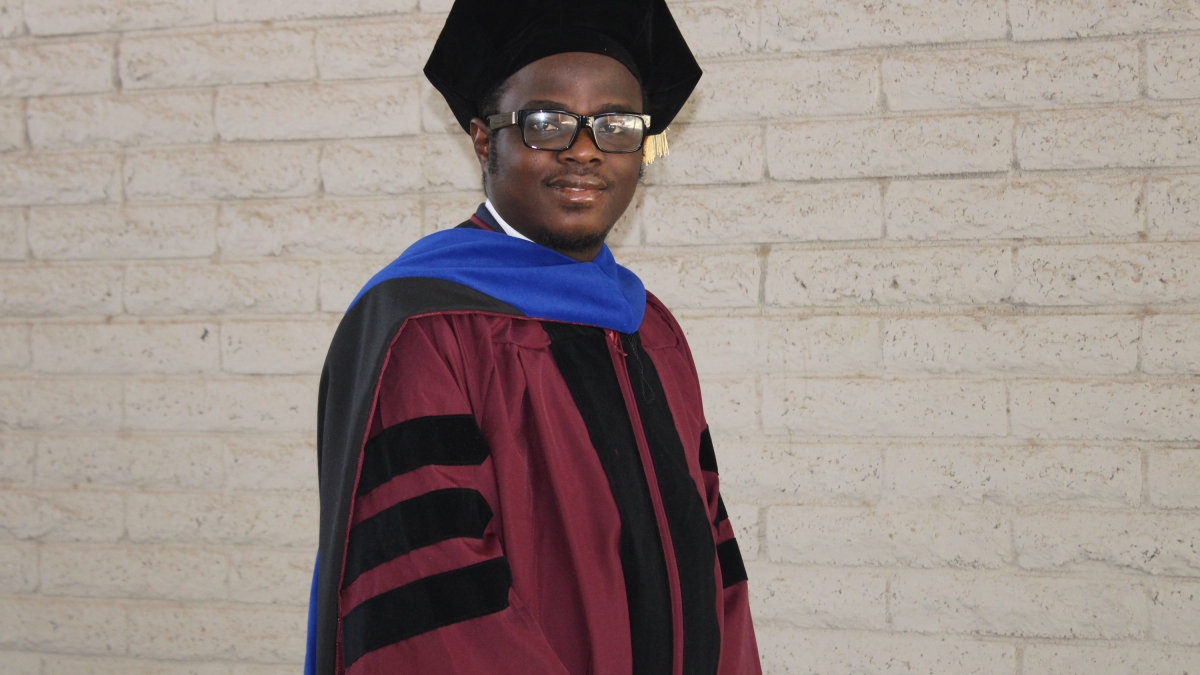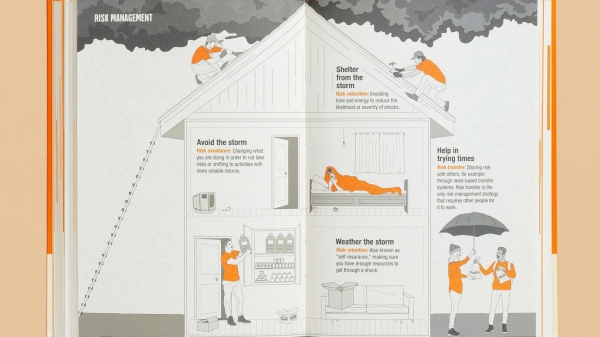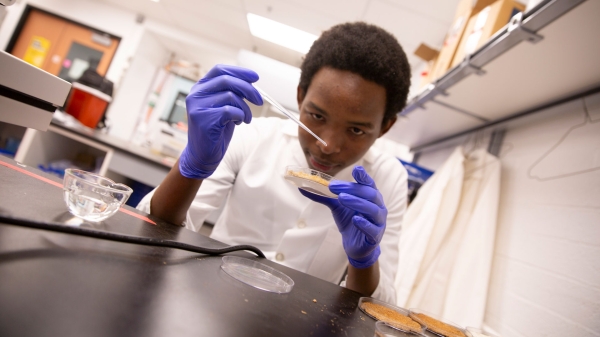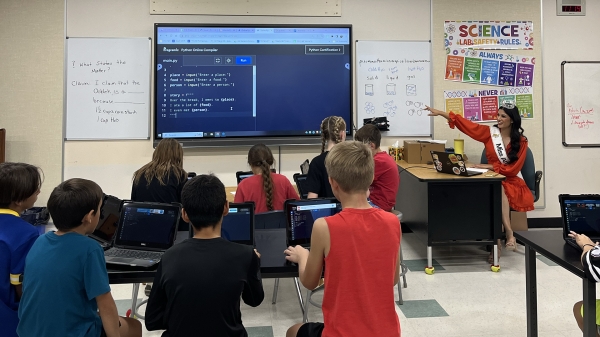PhD grad uses math to fight malaria, dengue and COVID-19

Enahoro Iboi’s research is focused on the use of mathematical modeling techniques to better understand the transmission dynamics and control of the diseases caused by mosquitoes, such as malaria, dengue and Zika, as well as other infectious diseases, such as the recent COVID-19.
Editor's note: This story is part of a series of profiles of notable spring 2020 graduates.
Enahoro Iboi was recently honored as a recipient of the 2020 Graduate Research Award from the School of Mathematical and Statistical Sciences. He is graduating this week with his PhD in Applied Mathematics from Arizona State University.
Iboi was born and raised in Lagos, Nigeria. His father worked as forklift driver at Cadbury Nigeria PLC while his mother was a petty trader. His father died just one month after Iboi began his master’s study at Ohio University.
“My late father loved education so much that he wanted me to get a doctorate degree in mathematics,” said Iboi. “He was unable to complete his high school education, but he always dreamed of me and my siblings attending college. He was not the richest but made sure we had the best education with the little resources he had.”
Iboi developed interest in mathematics while attending high school in Lagos State and went on to earn a bachelor’s degree in applied mathematics from the University of Benin, Nigeria. He was then offered financial support as a teaching assistant during his master’s program in mathematics at Ohio University in the U.S.
As his interest grew stronger in applied mathematics, Iboi wanted to study for his PhD at a university with excellent faculty and a strong track record in research.
“Arizona State University was my first choice because of its curriculum and the research expertise of its faculty,” said Iboi. “I got accepted to the PhD program here at ASU, and my expectations were exceeded. My experience at the School of Mathematical and Statistical Sciences has been awesome, and it has made a lifelong impact on me.”
Iboi’s research is focused on the use of mathematical modeling techniques to better understand the transmission dynamics and control of the diseases caused by mosquitoes, such as malaria, dengue and Zika, as well as other infectious diseases, such as the recent COVID-19.
His first research project at ASU was modeling the transmission dynamics of dengue fever in a population. His work was motivated by the approval of the Dengvaxia vaccine for use in 11 countries, including Mexico and the Philippines.
Iboi developed a novel mathematical model, of the form of a 27-dimensional deterministic system of nonlinear differential equations. Some of the notable features of his model included the inclusion of the dynamics of all four dengue serotypes, the effect of local changes in temperature, and the use of the Dengvaxia vaccine.
“Iboi did what I thought was practically impossible,” said Abba Gumel, Iboi’s PhD adviser and Foundation Professor. “I never expected that such rigorous results could be obtained for such a model with high dimensionality of 27 state variables and nonlinearity.”
Using data from Oaxaca, Mexico, the model simulations showed that the community-wide use of the vaccine would significantly reduce dengue burden, but it would not lead to the elimination of the four dengue serotypes unless other anti-dengue control measures were also implemented.
Iboi’s study further showed that the use of the Dengvaxia vaccine in people without prior dengue infection may induce increased risk of severe disease. This later result was corroborated by clinical data collected in the Philippines, and French pharmaceutical company Sanofi had to withdraw its vaccine from further use in humans.
Ibai’s strong interest in mathematical epidemiology has been reinforced by recent statistics that malaria is prevalent in 31 countries and caused 228 million cases and 405,000 deaths in 2018. Malaria is concentrated in the African region, accounting for about 90% of cases and mortality, with the majority of deaths in children under the age of 5.
“These figures are just one more factor that persuades me that my choice of research in mathematical biology was the right one,” said Iboi.
“Iboi contributes both in terms of the design of totally new, realistic and insightful mathematical models and in their detailed rigorous analyses,” said Gumel. “He also parameterizes these models using available data, including ecological, climatological, epidemiological and demographic, to derive realistic simulations, which can then be used to influence public health policy.”
In recent weeks, Iboi has shifted his focus to the novel coronavirus. He is co-author on two recently published papers, including one that suggests ending social distancing early could trigger a devastating second COVID-19 wave. He has a productive research record, with 10 articles already published, as well as an additional paper submitted and one more in progress. He has been invited to present his research results in many national and international conferences.
“Enahoro Iboi is very deserving of the 2020 Graduate Student Research Award,” said Al Boggess, professor and school director. “His research will continue to have significant impact in controlling diseases like dengue fever and malaria and, most recently, COVID-19.”
We asked Iboi to share more about his journey as a Sun Devil.
Question: What was your “aha” moment, when you realized you wanted to study the field you majored in?
Answer: When I published my first manuscript while at ASU.
Q: What do you like most about mathematics?
A: How mathematics can be used to solve global issues, such as cancer, malaria, COVID-19.
Q: What is something you learned while at ASU — in the classroom or otherwise — that surprised you or changed your perspective?
A: I learned so much while teaching the Pathways Pre-Calculus MAT 170. It changed my perspective of teaching that is more focused on students’ learning outcomes.
Q: What are your plans after graduation?
A: I would like to stay in academia and have received multiple employment offers, including tenure-track and post-doc positions at private liberal arts colleges and Ivy League universities.
Q: Which professor taught you the most important lesson while at ASU?
A: Dr. Abba Gumel taught me to be very hardworking, dedicated in all I do, and most importantly, to be a good person in life.
Q: What is the best piece of advice you would give to those still in school?
A: Stay focused, study hard and pray.
Q: What was your favorite spot on campus, whether for studying, meeting friends or just thinking about life?
A: Wexler Hall.
Q: What do you like to do in your spare time for fun?
A: I watch soccer.
Q: What do you think is most misunderstood about math by the general public?
A: That mathematics is boring and difficult.
Q: If someone gave you $40 million to solve one problem on our planet, what would you tackle?
A: Help fund research and development to eliminate malaria in sub-Saharan Africa.
More Science and technology

ASU author puts the fun in preparing for the apocalypse
The idea of an apocalypse was once only the stuff of science fiction — like in “Dawn of the Dead” or “I Am Legend.” However…

Meet student researchers solving real-world challenges
Developing sustainable solar energy solutions, deploying fungi to support soils affected by wildfire, making space education more…

Miss Arizona, computer science major wants to inspire children to combine code and creativity
Editor’s note: This story is part of a series of profiles of notable spring 2024 graduates. “It’s bittersweet.” That’s how…